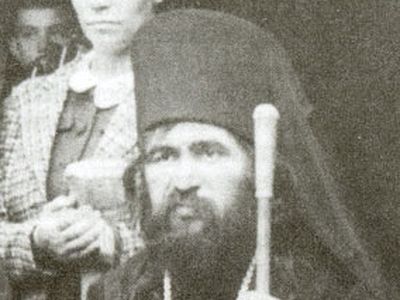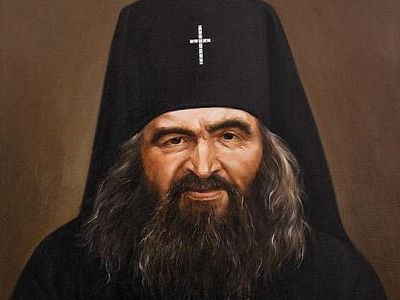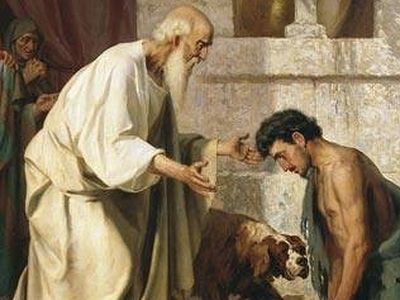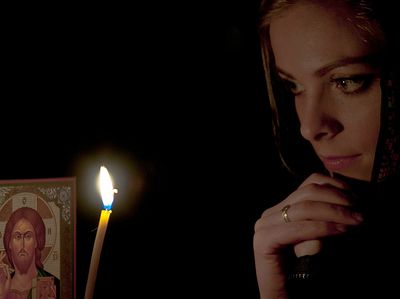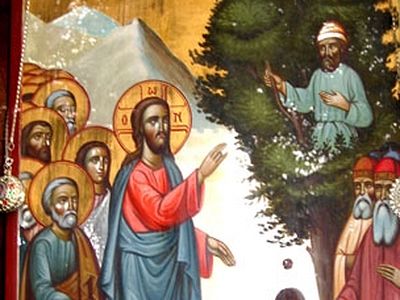
Today Is The Sunday of the Dread Judgment, and it is natural for us to speak of the Dread Judgment and of the signs of the end of the world. No one knows that day; only God the Father knows; but the signs of its approach are given in the Gospel and in the Revelation [Apocalypse] of the holy Apostle John the Theologian. Revelation speaks of the events at the end of the world and of the Dread Judgment principally in images and in a concealed manner; but the Holy Fathers have explained it, and there is an authentic Church tradition that speaks to us both about the signs of the approach of the end of the world and about the Dread Judgment.
Before the end of life on earth there will be confusion, wars, civil strife, famine, and earthquakes. Men will suffer from fear; they will expire from the expectation of calamities. There will be no life, no joy of life, but a tormenting state of falling away from life. There will be a falling away not only from life, but from faith as well: when the Son of Man cometh, shall He find faith on the earth? (Luke 18:8).
Men will become proud and ungrateful, denying the Divine Law: together with a falling away from life there will be also a dearth of moral life.
There will be an exhaustion of good, and a growth of evil. The holy Apostle John the Theologian, in his divinely-inspired work, the Revelation, also speaks of this time. He himself says that he "was in the Spirit," which means that the Holy Spirit Himself was in him when the fate of the Church and the world was revealed to him in various images, and that is why it is God's Revelation.
He represents the fate of the Church in the image of a woman who, in those times, hides in the wilderness: she does not show herself in public life, just as in Russia today.
Those forces that are preparing the appearance of Antichrist will have a leading significance in public life. Antichrist will be a man and not the devil incarnate. "Ann" is a word meaning "old," or it means "in place of" or "against." That man wants to be in place of Christ, to occupy His place and possess that which Christ ought to possess. He wants to possess the same attraction and authority over the whole world.
And he will receive that authority before his own destruction and that of the whole world. He will have a helper, a Magus, who, by the power of false miracles, will fulfill his will and kill those that do not recognize the authority of Antichrist. Before the destruction of Antichrist, two righteous men will appear who will denounce him. The Magus will kill them and their bodies will lie unburied for three days, and Antichrist and all his servants will rejoice exceedingly. Then suddenly, those righteous men will resurrect, and the whole army of Antichrist will be in confusion and horror, and the Antichrist himself will suddenly fall dead, slain by the power of the Spirit.
But what is known about this man, Antichrist? His precise ancestry is unknown. His father is completely unknown, while his mother is a defiled, pretended virgin. He will be a Jew from the tribe of Dan. There is an indication of this, in that Jacob, when dying, said that [Dan], in his posterity, would be a serpent by the way… biting the heel of the horse (and the rider shall fall backward) (Gen. 49:17). This is a figurative indication that he will act with craftiness and evil.
In Revelation, John the Theologian speaks of the salvation of the sons of Israel, that before the end of the world a multitude of Jews will be converted to Christ; but the tribe of Dan is not included in the enumeration of the tribes that are saved.
Antichrist will be very intelligent and gifted with the ability to deal with people. He will be charming and affectionate.
The philosopher Vladimir Soloviev worked extensively on this subject in order to present the advent and the personality of Antichrist. He made careful use of all relevant materials, not only Patristic, but also Muslim, and produced a very striking picture.
Before the advent of Antichrist, his appearance is already being prepared in the world. "The mystery is already at work" (cf. II Thess. 2:7), and the forces preparing his appearance struggle above all against lawful royal authority. The holy Apostle Paul says that Antichrist cannot appear until "he that restrains" is removed. John Chrysostom explains that "he that restrains" is the lawful, godly authority.
Such an authority struggles with evil. The "mystery" working in the world does not want this; it does not want an authority that wars against evil; on the contrary, it wants an authority of iniquity, and when it succeeds in bringing this about, then nothing will stand in the way of the coming of Antichrist. He will be not only intelligent and charming: he will be compassionate, he will be charitable and do good, for the sake of consolidating his power. And when he will have strengthened it sufficiently, so that the whole world acknowledges him, then he will show his real face.
He will choose Jerusalem as his capital, because it was here that the Saviour revealed His Divine teaching and His Person, and the whole world was called to the blessedness of goodness and salvation. But the world did not accept Christ and crucified Him in Jerusalem; while under Antichrist, Jerusalem will become the capital of the world that has recognized the authority of Antichrist.
Once having attained the summit of power, Antichrist will demand that men acknowledge his attainment as something to which no other earthly power and no other man could possibly attain, and he will demand that men bow down to him as to a superior being, a god.
Soloviev describes well the character of his activity as Supreme Ruler. He will do what pleases men, on the condition that they recognize his Supreme Authority. He will let the Church function, and allow her to hold Divine services, he will promise to build magnificent temples—provided he is recognized as the "Supreme Being" and that he is worshipped. He will have a personal hatred for Christ. He will live by this hatred and will rejoice at seeing men apostatize from Christ and the Church. There will be a mass falling away from the faith; even many bishops will betray the faith, justifying themselves by pointing to the splendid position of the Church.
A search for compromise will be the characteristic disposition of men. Straightforwardness of confession will vanish. Men will cleverly justify their fall, and an endearing evil will support such a general disposition. Men will grow accustomed to apostasy from the truth and to the sweetness of compromise and sin.
Antichrist will allow men everything, if only they "fall down and worship him." This is not something new. The Roman emperors were similarly prepared to grant the Christians freedom, if only they recognized [the emperor's] divinity and divine supreme authority; they martyred Christians only because they professed: "Worship God Alone and serve Him Alone."
The whole world will submit to him, and then he will reveal his hatred for Christ and Christianity. Saint John the Theologian says that all who worship him will have a mark on their forehead and right hand. It is not clear whether this will be an actual mark on the body, or if this is a figurative expression of the fact that men will acknowledge in their minds the necessity of worshipping Antichrist, as well as submit their wills to him. And when the whole world manifests such a complete submission—of both will and conscience—then the two righteous men [already] mentioned will appear and will fearlessly preach the faith and expose Antichrist.
Holy Scripture says that before the coming of the Saviour two "lamps," will appear, two "burning olive trees," "two righteous men." Antichrist will kill them by the power of the Magus. Who are these men? According to Church tradition, these are the two righteous who never tasted of death: the Prophet Elias and the Prophet Enoch. There is a prophecy that these saints, who had not tasted of death, will taste it for three days; but after three days they will resurrect.
Their death will be a great joy for Antichrist and his servants. Their rising three days later will bring them unspeakable horror, terror and confusion. And then will come the end of the world.
The Apostle Peter says that the first world was created out of water and perished by water. "Out of water" is also an image of the chaos of the physical mass, while "perished by water" is [an image] of the Flood. And now the world is reserved unto fire.....The earth also and the works that are therein shall be burned up (II Peter 3:7-10). All the elements will melt. This present world will perish in a single instant. In an instant everything will change.
And the sign of the Son of God will appear, that is, the sign of the Cross. The whole world, having willingly submitted to Antichrist, "will break out in lamentation," Everything is
finished. Antichrist is slain. The end of his kingdom, the end of the war with Christ. The end, and accountability for one's whole life, an account to the True God.
Then, from the mountains of Palestine, the Ark of the Covenant will appear. The Prophet Jeremiah hid the Ark and the Holy Fire in a deep well. When they took water from that well, it burst into flame. But the Ark itself they did not find.
When we look at life today, those able to see, see that everything foretold about the end of the world is being fulfilled.
Who then is this man — Antichrist? Saint John the Theologian figuratively gives him the name 666; but all attempts to understand this designation have been futile.
The life of the contemporary world gives us a fairly clear understanding of the possibility of the world burning up, when all the elements shall melt with fervent heat. Atomic fission gives us that understanding.
The end of the world does not signify its annihilation, but its transformation. Everything will be changed, suddenly, in the twinkling of an eye. The dead will resurrect in new bodies — their own, but renewed — just as the Saviour arose in His Body, and on it were the traces of the wounds from the nails and the spear; but it possessed new properties, and in this respect it was a new body. It is unclear whether this will be an altogether new body or that with which man was created.
And the Lord will appear on the clouds with glory. How will we see Him? With our spiritual eyes. Even now, at death, righteous people see that which other people around them do not see.
The trumpets will sound, loud and powerful. They will trumpet in men's souls, in their conscience. Everything in the human conscience will become clear.
The Prophet Daniel, speaking of the Dread Judgment, relates how the Ancient of Days, the judge, is on His throne, and before Him is a river of fire. Fire is a purifying element. Fire scorches sin, it burns it up, and woe also burns it up; if sin has become natural to a man, then it burns up the man himself as well.
That fire will flare up inside a man: on seeing the Cross, some will rejoice, while others will fall into despair, confusion, terror. In this way, men will immediately be separated. In the Gospel narrative, some stand to the right of the Judge, some to the left — their inner consciousness separated them. The very state of a man's soul casts him to one side or the other, to the right or to the left.
The more consciously and persistently a man strives toward God in his life, the greater will be his joy when he hears the words: "Come unto Me, ye blessed"; and conversely, those same words will call forth the fire of horror and torment on those who did not want Him, who fled or fought or blasphemed Him during their life.
The Dread Judgment knows no witnesses or charge-sheets. Everything is recorded in men's souls, and these records, these "books" are open. Everything becomes clear to all and to oneself, and the state of a man's soul assigns him to the right or to the left.
Some go to joy, others to horror.
When the "books" are open, it will become clear to all that the roots of all vices are in man's soul. Here is a drunkard, a fornicator; some may think that when the body dies the sin dies as well. No; the inclination was in the soul, and to the soul the sin was sweet.
And if [the soul] has not repented of that sin and has not become free of it, it will come to the Dread Judgment with the same desire for the sweetness of sin and will never satisfy its desire. In it will be the suffering of hatred and malice. This is the state of hell.
The "fiery Gehenna" is the inner fire; this is the flame of vice, the flame of weakness and malice; and there will be [the] wailing and gnashing of teeth of impotent malice.


